Magnesium heart
Magnesium heart is the element that gives protection against cardiac troubles and a host of other diseases; it is water-soluble so we need to get our supplies daily from our food, starting with breakfast.
In landmark research Japanese scientists report in the journal Atherosclerosis that a study of nearly 60,000 initially well persons over a 15-year period revealed that 2690 people died of cardiovascular disease.
- 1227 from strokes
- 557 persons from coronary heart-disease
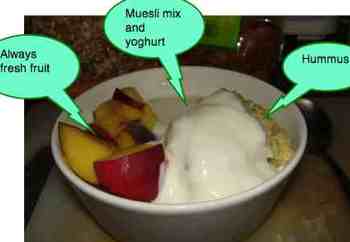
This page was last updated by Bernard Preston on 4th October, 2025.
After evaluating the mineral intake in their diets using a special questionnaire, they concluded that there was an inverse-correlation between heart disease and magnesium food consumption; and both ischemic and haemorrhagic stroke too.
"Increased dietary magnesium intake was associated with reduced-mortality from cardiovascular disease especially for women."
In short those people eating food high in magnesium had a fifty-percent lower incidence of heart disease and stroke; note the words "dietary intake."
Managing heart disease
The management of heart disease means tackling the catastrophe at three levels.
- Core supplements
- Management of blood pressure, homocysteine and plasma sugar
- Targeting the drivers of heart disease
1. Core supplements
Core supplements should at least include magnesium, dietary nitrate[5] and vitamin E; fatty fish and freshly-ground flax seed for omega 3 oils too.
As always research shows that these supplements are best obtained from our food.
2. Blood pressure and sugar
The natural management of blood pressure is best done by consuming large amounts of dark-green leafy vegetables; for the dietary nitrate. Much is located in the stalks; chop them up finely.
The only way to keep blood sugar in check is to stick to low GI foods, whole carb intake in moderation and strictly limiting refined starches.
3. Targeting the drivers of heart disease
Generalised inflammation in the body is probably the top driver of heart disease and many other chronic degenerative conditions too.
Bowel health must come a close second. That means plenty of probiotic foods and fibre to feed the friendly normal flora.
And thirdly the management of obesity. It's a bridge too far for the majority but those who keep refined grains and sugar only for high and holy days will never need to diet again.
Sleep, heart disease and stroke
The connection between the risk of heart disease and stroke with sleep is well established.
That risk would be reduced scientists have found by as much as 60% if four of the following five characteristics were achieved.
Perfect sleep is characterized by 7 to 8 hours of rest per night, getting up early and not going to bed late.
Insomnia, sleep apnea and excessive daytime drowsiness come into the equation too.
- France's National Institute of Health and Medical Research
Furthermore a regular short afternoon nap, less than 30 minutes improves memory, alertness and problem solving; and cardiovascular health in general. It's a protective factor against dementia too.
Magnesium Heart
Magnesium heart in spinach is what gave Popeye cardiac-protection.
This is consistent with research about homocysteine cardiovascular in which it has been found that a toxic amino acid builds up in the tissues in the absence of certain vitamins and minerals; especially magnesium and zinc.
Homocysteine build-up is strongly correlated with
atherosclerosis and furring of the arteries leading to coronary heart
disease and stroke; and many other conditions. Read more at "The H factor." Find it using Site Search.
Nutritious choice foods
Choice foods are those that give you an even-chance of reaching eighty with all your marbles and joints intact; and taking a minimum of pills.
Our choice foods page gives you some simple suggestions that can swing the statistics in your favour. Heart disease and type 2 diabetes are largely preventable if you choose the right lifestyle. It must include magnesium-rich meals and whole grains.
Magnesium and blood pressure
"The researchers concluded that oral magnesium supplementation can reduce
blood pressure in patients with HT who take antihypertensive
medication; the mean decline was 18.7 systolic points and 10.9 diastolic."
- Medscape
Magnesium and blood-pressure are known to be inversely correlated; and of course lower BP means less cardiovascular disease.
Foods high in magnesium should include especially the dark-green leafy vegetables like spinach[3] and broccoli; and legumes too. Nuts, seeds and oats[4] are also rich sources of the mineral.
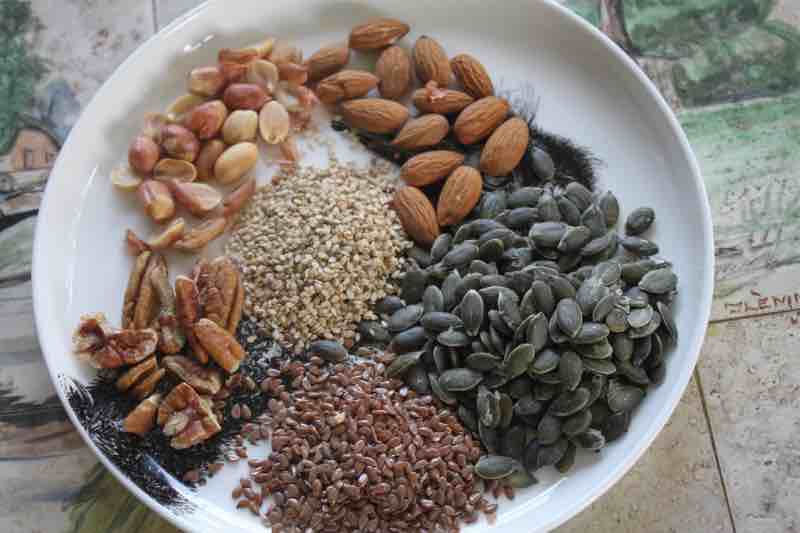
A simple way to significantly increase the dietary sources of magnesium would be to add these foods three times a day. They all have huge other benefits too. They provide natural fibre for your constipation, help in lowering cholesterol and add vegetable protein to reduce our reliance on red meat; and they taste great.
Plus they are low in carbohydrate, so they fit in perfectly if you are following one of the ketogenic diets; losing weight by enjoying reduced refined starch with high-fat meals.
Personally I have considerable difficulties with the classic Banting diet; we are going to see an uptick in the malignant-tumours methinks from all that red meat.
So if you are obese, then seriously consider this "modified Banting diet." Find it using Site Search; it's the weight-loss plan that I feel I can recommend. Learn too about net carbs.
The ketogenic diets do have merit but like all others they are simply not sustainable. Can you give up bread for ever? If not, do not bother starting. We believe it's the refined carbs that do the damage, not those in whole grains and legumes.
Surprisingly simple isometric quadriceps exercises help significantly if done daily[6]; lowering both blood pressure values by around 10 points.

Foods that contain magnesium
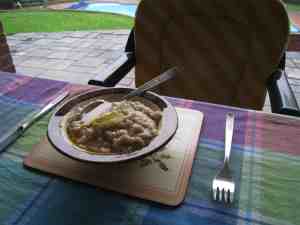
There are only two important criteria for me when preparing food.
- How nutritious are the ingredients?
- How quickly can I prepare it?
- The taste comes a distant third.
This site is about slow food, made fast. How pretty it is does not come even vaguely into the picture, except when we are having guests.
We have a glut of TV programmes these days on cooking but there is one big problem. They take so long, using precious hours we do not have; so we do not even attempt them. And except for Jamie Oliver, whether it is good for you or not is rarely mentioned.
So yes, my oats above looks like a dog's breakfast; but it is very quick to make, tastes divine with a tad of butter and is extremely nutritious. We alternate with stone-ground grits which is also rich in magnesium; but only if it is the whole grain.
Breakfast
- To a few tablespoons of steel-cut or rolled oats add half a dozen almonds, a few prunes and a
little salt; a tsp of butter and half a cup of
boiling water. Leave it to stand for half an hour; or microwave for one
minute. Add a teaspoon of raw honey.
- Enjoy your breakfast by the pool this summer. More
light means less depression remember. Do be careful if your prunes have
pits; they are very similar in shape to almonds. Do not provide your dentist
any extra work. If this gives you indigestion then gently simmer the oats for five to ten minutes.
- These Quaker oats recipes are vital if you have a cholesterol problem; prunes give the scientifically proven best quick constipation relief.
- Eggs Florentine also makes the perfect magnesium breakfast. In fact this is my favourite summertime meal. By all means add a little tomato or a baby zucchini squash; garlic and chili will give it some zip.
"Quick constipation relief" gives proven protection against colorectal disease too; use that Site Search function.

Leave out the toast if you are banting. And drop a blob of butter on the spinach to help with the absorption of the carotenoids; low carb, high fat.
Butter is back you know. Julia Childs would be pleased.
Do you want more minerals from your food? Magnesium from nuts and seeds is one good option.
Lunch
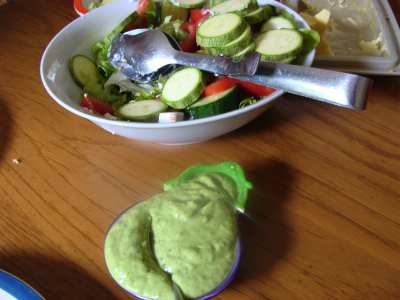
After radishes and pole beans, spinach is about the easiest vegetable to grow in the garden. And it goes on bearing for months. It is a great food, high in magnesium.
Young green leaves and radishes in a salad with Bernie's delicious spinach dip are amazing.

If you really want to be posh, then consider this authentic hummus recipe made of garbanzo beans, parsley and sesame seeds; it is certainly one of the best foods high in magnesium[1].
It takes me only four minutes to make hummus. It oxidises within a few days, so manufacturers load the supermarket stuff with chemicals. Then it tastes and is awful. Here is still more magnesium heart food.
Just 4 branching broccoli seedlings planted in the back garden in the spring
will bear for months. After you have picked the main head,
small florets keep appearing for an age; perfect for a soup. The beautiful yellow flowers are also very crunchy and will brighten any salad.
Just as important is that broccoli is the queen that rules over all in the anti-tumour stakes.
It does have quite a long growing season; plant them early in spring once the risk of frost is over. Better still, they grow well in late summer and into early winter. Choose the right variety with help from your nurseryman.
The material expressed on this page is gleaned from the nutritional and environmental literature; it is clearly referenced. A plain distinction is made between the author's opinion and that which is scientifically proven. When in doubt consult your health professional.
To suggest a correction or clarification, write to Dr Bernard Preston here. Contact.
Newsletter
Our newsletter is entitled "create a cyan zone" at your home, preserving both yourself and Mother Earth for future generations; and the family too, of course. We promise not to spam you with daily emails promoting various products. You may get an occasional nudge to buy one of my books.
Here are the back issues.
- Lifestyle and ideal body weight
- What are ultra-processed foods?
- Investing in long-term health
- Diseases from plastic exposure
- Intensive lifestyle management for obesity has limited value
- A world largely devoid of Parkinson's Disease
- The impact of friendly bacteria in the tum on the prevention of cancer
- There's a hole in the bucket
- Everyone is talking about weight loss drugs
- Pull the sweet tooth
- If you suffer from heartburn plant a susu
- Refined maize meal and stunting
- Should agriculture and industry get priority for water and electricity?
- Nature is calling
- Mill your own flour
- Bake your own sourdough bread
- Microplastics from our water
- Alternative types of water storage
- Wear your clothes out
- Comfort foods
- Create a bee-friendly environment
- Go to bed slightly hungry
- Keep bees
- Blue zone folk are religious
- Reduce plastic waste
- Family is important
- What can go in compost?
- Grow broad beans for longevity
- Harvest and store sunshine
- Blue zone exercise
- Harvest and store your rainwater
- Create a cyan zone at your home
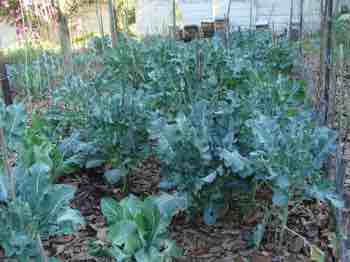
How to grow broccoli is a topic close to Bernard Preston's heart, literally and figuratively speaking. The magnesium and just as important, phytochemicals like sulforaphane and kaempferol are three of many vital substances, mostly unknown to us.
Just the fibre that gets through to the colon feeding the microbiota and giving protection against the neurodegenerative diseases like Parkinson's is a good enough reason to put in a few plants this year.
One cob of corn contains about 10% of the daily magnesium requirement. Making the time to chew our food thoroughly is pivotal.
Dinner
Steam or boil your veggies in very little water; research shows that about a third of the magnesium is lost otherwise.
Save that spinach or broccoli water to make a soup or gravy.
I used to devein our spinach when cooking it but I do not bother any longer. There are plenty of nutrients in those stalks; especially nitrate for lowering blood pressure.
It struck me as weird that we eat the stalks of celery and throw away the leaves.
But we eat the leaves of spinach and throw away the stalks.
The benefits of spinach are legion, especially it is a rich source of magnesium for the heart; I am not exaggerating when I say we enjoy it at least 300 days in the year in one form or another.
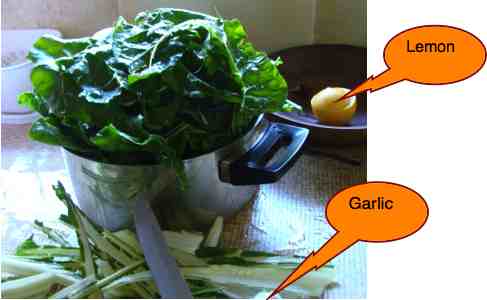
Magnesium gall bladder stones
Researchers at the Kentucky Medical Centre after following forty-three thousand men found that those who ate plenty of food high in magnesium had thirty percent less gall stones.
What is more, eating foods that contain magnesium was more effective than taking it from supplements; probably because of the fibre containing the element.
According to the study, over ten percent of the people eating the common supermarket diet suffer from gall bladder disease.
Magnesium heart has benefits for many other organs too.
Magnesium overdose
There are dozens of food supplement companies that will do their level best to convince you that the way to increase your magnesium heart is to purchase their products.
Magnesium, zinc and calcium are in a very fine balance in the body. Should you overdose on any one of them it can have serious repercussions. Think rather of foods that contain these minerals providing the perfect ratio.
Magnesium and arthritis
A magnesium deficiency also results in calcium deposition in the soft tissues causing arthritic diseases like chondrocalcinosis; kneecap pain and possibly frozen shoulder.
Magnesium kidney stones
Renal and Urology News reports that there is strong research confirming that raising the magnesium in your diet inhibits the formation of crystals in the kidneys.
Previously oxalates in spinach were considered a snag; many magnesium-rich greens are also high in certain "antinutrients." The latest research refutes the association.
A sweet tooth incidentally, they report increases your risk of kidney stones by more than 30 percent. Magnesium heart is good for the other organs too, obviously.
Magnesium and diabetes
Magnesium and diabetes are also strongly inversely linked. Research from Tufts University found that those who consumed the highest amount of magnesium from their food were 32% less likely to contract diabetes that those who ate the least; that's massive.
They report that the best sources are whole grains, nuts and fish; and vegetables too.
Moreover only 50% of Americans enjoy the RDA for magnesium heart. Is it any wonder that diabetes and cardiovascular diseases are expanding in leaps and bounds?
100% whole wheat flour is difficult to get unless you grind your own as we do. Cracking your own pecan nuts is simple; and enjoying vegetables such as kale, spinach and broccoli is really not that arduous. Would you rather inject yourself every day with insulin? Nearly 50 percent of those enjoying mainly grocery store food are prediabetic; it doesn't just happen to "other people."
- Pecans nutrition
- Nutritional value of Kale
- Recipes for Swiss chard
Find the links to those topics highlighted in bold by copying and pasting into the Site Search function in the navigation bar above.
Magnesium and migraine
There is evidence that migraine sufferers are likely to be deficient in magnesium as compared to those who are well. However the research is not strong that supplements will be effective in preventing the headaches.
According to research published in the Journal Headache, high levels are "possibly effective."
Diarrhoea is a common side-effect; and magnesium from supplements can be toxic for those with cardiac and lung conditions.
However there are no side-effects by increasing magnesium from our food; and it's a good thing to do anyway. It just might help prevent migraine headaches.
Bernard Preston
Bernard Preston is a wellness-nut and proud of it. He does not like pain and has no desire to see his patients drop dead twenty years before their time with preventable diseases. Magnesium heart is for all of us.
Did you get that Tufts' research? Only 50% of Americans reach the RDA for magnesium.
More dark-green leafy vegetables, plenty of freshly cracked pecan nuts and fish at least twice a week are needed; and dare I suggest it, your own homemade low GI bread. It takes me just five minutes daily to mill the flour and mix the dough. Five hours later you have the perfect loaf, rich in magnesium and many other nutrients.
Is that too much to ask to save yourself from a triple-bypass and injecting yourself four times a day with insulin?
Get your magnesium heart intake up; and remember it is far better from your food than from pills. Yes, improving one's well-being does take some effort; rather that than the difficulty and expense of driving to the ER with chest pain.
Why is there a ban on margarine? Simply because "hydrogenated foods" are bad for the heart. Find out more by typing the phrase into Site Search.
Growing green beans for vegetable protein and more magnesium are a big part of our agenda; they are so rewarding.
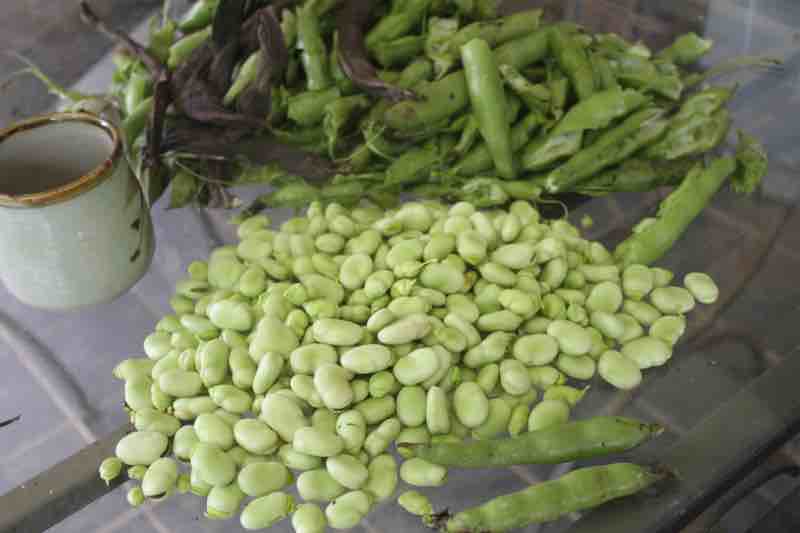 Beans are rich in vegetable protein, magnesium and many other important nutrients.
Beans are rich in vegetable protein, magnesium and many other important nutrients.When browsing use right click and "Open Link in New Tab" or you may get a bad gateway signal.
Did you find this page interesting? How about forwarding it to a friendly book or food junkie? Better still, a social media tick would help.
Address:
56 Groenekloof Rd,
Hilton, KZN
South Africa
Website:
https://www.bernard-preston.com